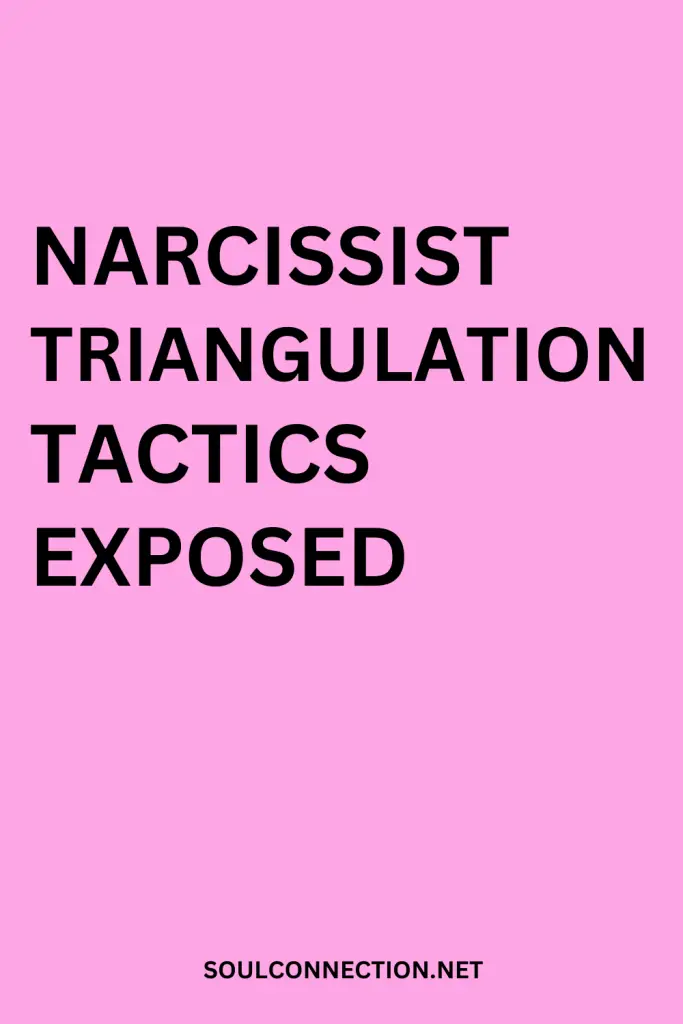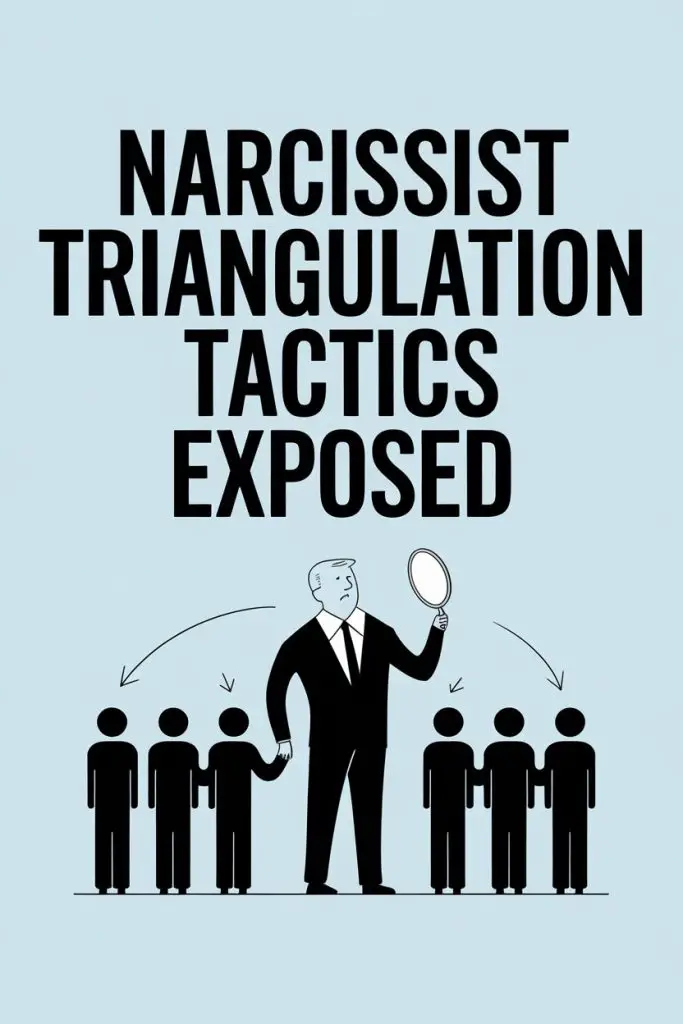Narcissists are rarely content with a straightforward, one-on-one dynamic. Why settle for a simple argument when you can stir up a full-blown soap opera, right?
At the center of their drama toolbox sits triangulation—a favorite move guaranteed to leave you feeling off-balance and questioning your sanity.
Ready for a closer look at how narcissist triangulation works and how you can outsmart it? Pull up a chair. This one’s a doozy.
What Exactly Is Triangulation, and Why Do Narcissists Love It?
Triangulation happens when someone brings a third party into your relationship drama, usually to manipulate, control, or destabilize you.
Imagine your partner mentioning how their ex always “understood them better” mid-argument. Or maybe you hear from a mutual friend that your partner “thinks you’re too sensitive.”
There it is—the classic triangle. You, them, and a third person (real or imaginary) acting as the wedge.
Narcissists adore triangulation because it gives them power, validation, and the joy of watching you squirm. If they can get you competing for their affection, doubting yourself, or fighting with someone else, they’ve hit the jackpot.
The Classic Love Triangle: Oldest Trick in the Book
Nothing gets a narcissist’s engine revving like pitting two people against each other.
They’ll drop hints about a “close friendship,” text an ex in front of you, or compare you to someone else—always with a look that says, “Try harder.”
The goal? To make you insecure, heighten your anxiety, and set you scrambling to win back their attention. Bonus points if you start resenting the other person instead of questioning why your partner is playing mind games.
No, your partner’s high school “best mate” isn’t just really good at sharing memes. Narcissists use this as bait, watching to see who will dance hardest for their approval.
Gossip and The Flying Monkey Brigade
Ever heard something about yourself from a third party that made your head spin? That’s the narcissist at work, passing along selective tidbits—often twisted or exaggerated—to paint you as unstable, needy, or downright villainous.
Narcissists recruit others (the infamous flying monkeys) to do their dirty work. Suddenly, friends or family are echoing your partner’s narrative, and you’re left wondering who you can actually trust.
It’s all about isolating you and making you doubt your own reality. If enough people tell you “you’re overreacting,” you might just believe it. Spoiler: You’re probably not.
The “Expert” Opinion
When all else fails, a narcissist will call in outside opinions—therapists, self-help books, even strangers on social media—to back up their point.
“Oh, my therapist says you’re emotionally immature.”
“I read that people who love drama react like you do.”
Suddenly, you’re not just up against your partner; you’re up against “expert testimony.” This is designed to shut down your perspective and paint you as the problem.
The more outnumbered you feel, the easier it is to control you.
Gaslighting on Steroids
Triangulation and gaslighting go together like gin and tonic (or a dodgy kebab and regret). The narcissist manipulates reality so thoroughly that you’re left wondering whether you overreacted, misheard, or made things up entirely.
They’ll tell you, “Sarah agrees with me—you really ARE dramatic,” when Sarah, in fact, said no such thing.
Or perhaps, “Even your mother thinks you’re too sensitive,” when in reality, your mum just called to ask how you’re doing.
You start questioning your memory, your emotions, even your grip on reality. That’s precisely where a narcissist wants you.
Divide and Conquer: Alienation from Friends and Family
A narcissist doesn’t just want control over you—they want control over your relationships. Triangulation often involves subtle (or not-so-subtle) acts of sabotage between you and your loved ones.
Maybe your partner “accidentally” lets slip to your best mate that you’ve been gossiping about them. Or they tell your family you’re struggling with something you never shared.
Suddenly, people you once trusted are distant, defensive, or icy.
Guess who you end up relying on for comfort and validation? That’s right—your narcissistic partner. Mission accomplished.
Social Media Shenanigans
Nothing says 21st-century triangulation quite like a cryptic Instagram story or a strategically placed “like” on an ex’s post.
Narcissists thrive on jealousy and public performance. They’ll parade new friendships, inside jokes, or flirtatious comments in front of you and the world, just to see how you react.
You’re not imaging it—this is manipulation, straight from the narcissist’s playbook. Unfollowing, blocking, or just stepping back from social media can work wonders for your peace of mind (and sanity).
The Silent Treatment as a Weapon
The silent treatment isn’t just about shutting you out—it’s about making you frantic for attention.
But when the narcissist suddenly becomes chatty with someone else in your presence? That’s triangulation with a side of emotional starvation.
You’re left desperate to get back in their good graces, while the third party (friend, coworker, even the cat sometimes) basks in the narcissist’s attention.
This leaves you feeling rejected, jealous, and unworthy—exactly where a narcissist wants you.
Kids in the Crossfire
Unfortunately, narcissists don’t draw the line at adults. They’ll use children—yours, theirs, or stepkids—as pawns in their triangulation tactics.
One parent becomes the “fun” one, while the other gets painted as strict or unreasonable. The child is caught between two worlds, confused and often forced to pick sides.
This isn’t just unfair—it’s emotionally damaging. If you suspect this is happening, seeking out a family therapist or mediator (with experience in narcissistic dynamics) can make a world of difference.
How to Outsmart Narcissist Triangulation Tonight
Let’s get practical. Here’s how to spot triangulation in real time and set boundaries that actually work:
- Name it (internally or out loud): The moment you sense a triangle forming, mentally flag it. “Ah, here comes the third wheel.”
- Don’t compete: When the bait is dangled (“My ex never complained about this”), refuse to bite. Try, “That’s between you and your ex,” and change the subject.
- Set boundaries with outsiders: If friends or family have been given a “version” of you, calmly clarify your side—once. Don’t get sucked into drama.
- Stay grounded in your reality: Keep a journal or screenshots if you’re starting to question your memory. Facts are your new best mate.
- Seek support outside the triangle: A therapist, support group, or trusted friend can keep you tethered to reality and remind you you’re not as crazy as the narcissist wants you to believe.
- Limit or block social media access: If they’re using online platforms to needle you, cut off their stage.
- Prioritise self-care: This isn’t indulgence—it’s survival. Take a walk, call a mate, eat something nourishing. You’re no good to anyone when you’re running on empty.
Building Your Anti-Triangulation Toolkit
You’re not powerless in the face of narcissist triangulation. Recognising the tactic is the first step toward reclaiming your reality and your relationships.
Remember, you’re not “too sensitive” for noticing when someone is stirring the pot. It takes guts to see through manipulation—and even more to step back and refuse to play along.
If you’re enmeshed with a master triangulator, give yourself permission to step out of the ring. You don’t have to compete, prove, or justify.
Sometimes, the healthiest response is a polite shrug and a quick exit.
And if you’re worried about looking “rude”? The only thing you owe a narcissist is your indifference.
The Power of Walking Away
Triangulation thrives in secrecy and confusion. Shine a light on it, set clear boundaries, and refuse to engage—and watch the narcissist scramble for a new strategy.
Relationships are messy, complicated, and sometimes downright bizarre. But you deserve one where you’re loved for who you are, not for how well you can fight for someone’s scraps.
Here’s to spotting the triangle, stepping out of it, and finding peace—no geometry required.


